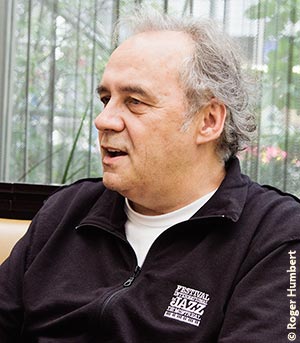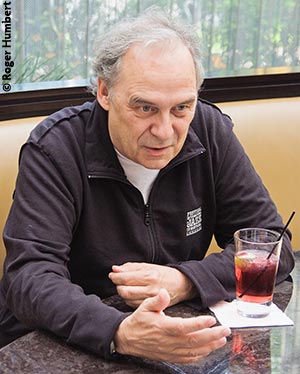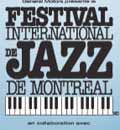|
Second, the big asset is the entertainment district. The fact that we have all this concentration of venues within the same neighbourhood… we have small theatres, pocket theatres, large ones, a symphony hall, and so on... with the free stages, it’s like having two festivals in one: the big outdoor party and the indoor, with a very different ambience. We figured this out over time… I call it “concept after the fact”. The free stages are important… mainly, it’s all about democracy and respect. People that come there without a penny won’t feel out of place.
We are very particular; at some point we figured out what worked and what didn’t work.
OD Which seasons stand out as your favourites and why?
AM ’82 was a big year for takeoff. We did two series at St. Denis, we had all the biggies there… ’82, '83 we had Miles, Ella, Sarah Vaughan, Dexter Gordon… in 1989, the 10th anniversary, we had the big show with Pat Metheny on McGill avenue, fond memories of that one. I don’t know why, but in 1995, everything fell in place, we had B. B. King and Buddy Guy together and I programmed it like a boxing match because I realized all my friends who liked blues also liked boxing and vice versa... so we had them each do a separate set and then a “confrontation” (laughs). Also that year we did our first collaboration with Cirque du Soleil… we didn’t realize then that this was like a wedding made in heaven between two very much loved institutions in Montréal.
OD To what degree does weather play a role in the festival’s success?
AM Well, obviously, much of the program takes place outdoors so it is a factor. But not to a great extent because where we are everything is concrete, so you can retire to the mall... the strange thing — I don’t talk money normally — when we have bad weather, obviously the vending falls apart, beer sales go way down… but the merchandising stays the same. I mention that because merchandising accounts for a significant fraction of our budget.
|
|
 |
|

André Ménard |
|
|
| OD What are some of the biggest risks you have taken in terms of programming?
AM We have brought artists that had no notoriety whatsoever in Montréal, and I would guarantee the show… I did that for Bela Fleck — I said “This guy is so good, you cannot not like what he is doing and I am prepared to give you back your money if you did not enjoy the show." And I never had to reimburse a single person… I did this about 10 times. Obviously I had to be pretty sure about the artists. Bela filled the Spectrum and nobody here knew him.
OD What has been the greatest challenge in your job?
AM To try and remain relevant, to try and bring things that haven’t come yet to our city, this is I think the main challenge. Now we are pretty established in terms of the size of the festival… we can vary from year to year with the milieu that we are using but the challenge is to stay relevant and excited about it, and never to take it for granted and say “ok, we are doing good now, all we need is a good marketing team.” It’s not like that. It really is about respecting the art and the artists because at the end of the day they are the reason the halls are packed, not us. We always treat the artists with the utmost respect, and I think that’s very important.
OD What is special about jazz music?
AM Well, jazz is the music that — well it’s the American classical music, I think we can say. It’s a music that has the ability to integrate lots of influences, lots of different factors, and also influence other forms of music as well. Sometimes we are asked to think “jazz is in danger, jazz is dying” and all that, and obviously those that invented jazz are not around anymore. But who could have predicted 25 years ago that Diana Krall would become such a superstar? Who would have predicted that Wynton Marsalis would become such an institution and create such an institution in New York City? So jazz has progressed in this way. The fact is that since the record industry has fallen apart, new methods of distribution are here, new contacts are being made, you can work with musicians from everywhere in the world. I think that this new context really favours jazz, you hear jazz influence in techno music and house music, it’s everywhere.
OD What has been the greatest lesson over the past thirty years in the business?
AM There’s so many of them… music is a very important part of my life. I realize that some people don’t know that certain songs are like vitamins. You hear a piece of music and you feel better or stronger. Music has the ability to transform your life. So the lesson is that sometimes when you let what is best about your life take its proper place — music for me was like that — I think that you can achieve great things. To me the big wonder is that my life is still the same way as when I was 18… I have survived like this, but I always trusted my instincts and I always trusted the music and as far as I’m concerned as long as there is music around you, it’s a better world. You can never have too much music in the world, except when it’s loud in a restaurant, this I hate.
OD What would you say is the most common misperception about FIJM?
AM That it’s organized by the city of Montréal … this is happening less and less but in the beginning people would say “wow, all these streets, it must be the city”… but a total misconception because for many years even if we had gone way past our budget, the city would not give us more than $100,000, which is a small fraction of our budget. But still, they let us be; some cities would never even let you do it. So that would be one. The other one I wouldn’t say is common, but some people do think we have become more about business than the music. Mark Miller once wrote in the Globe & Mail that there are two kinds of organizers in Canada: true music lovers and wheelers & dealers, and he put us in the second category. I was really hurt. I told him how I felt, I said “you cannot say that”. I don’t feel the need to justify myself all the time, but if there is a misconception about what I do, that would be one.
OD Do you take the feedback you receive seriously?
AM Absolutely. Montréalers really take it to heart. When they feel something went astray, they do tell us. I can take that, it’s not a problem. Criticism is normal, but… it’s funny sometimes. It’s easy to criticize a lineup, but people don’t realize how many realities you have to pile up before an artist gets here… some people say “why don’t you have this and this and this?” and I say “I wish I could”. The money is so good in Europe, which is our main competition.
OD When the festival starts, are you nervous, or able to enjoy?
AM The first day is always a bit laborious. Compare it to a big jumbo jet trying to take off so you need all the engines to work and the proper gasoline in the plane, but once it’s in the air it’s cruising. But you will never catch me having dinner with an artist or a sponsor. Lunch, breakfast, no problem. But as of 5 in the afternoon I disappear, I go and see the shows. We don’t put on all these shows just to miss them.
OD The hottest tickets for the 30th anniversary season, June 30th – July 12th are:
AM The outdoor shows, starting with Stevie Wonder and ending with Ben Harper, The Patrick Watson Concert, the Cuban Group Desandann, Wynton Marsalis, Melody Gardot, Wayne Shorter, Maria Schneider, and a fantastic duo I caught in London last year, Stefano Bollani and Enrico Rava. That’s by memory… if I had the program I could give you twenty more.
|




